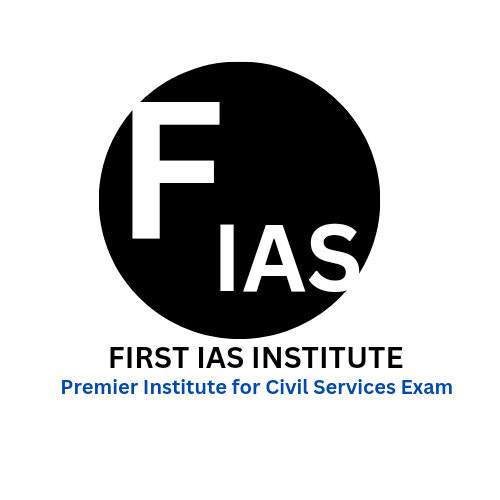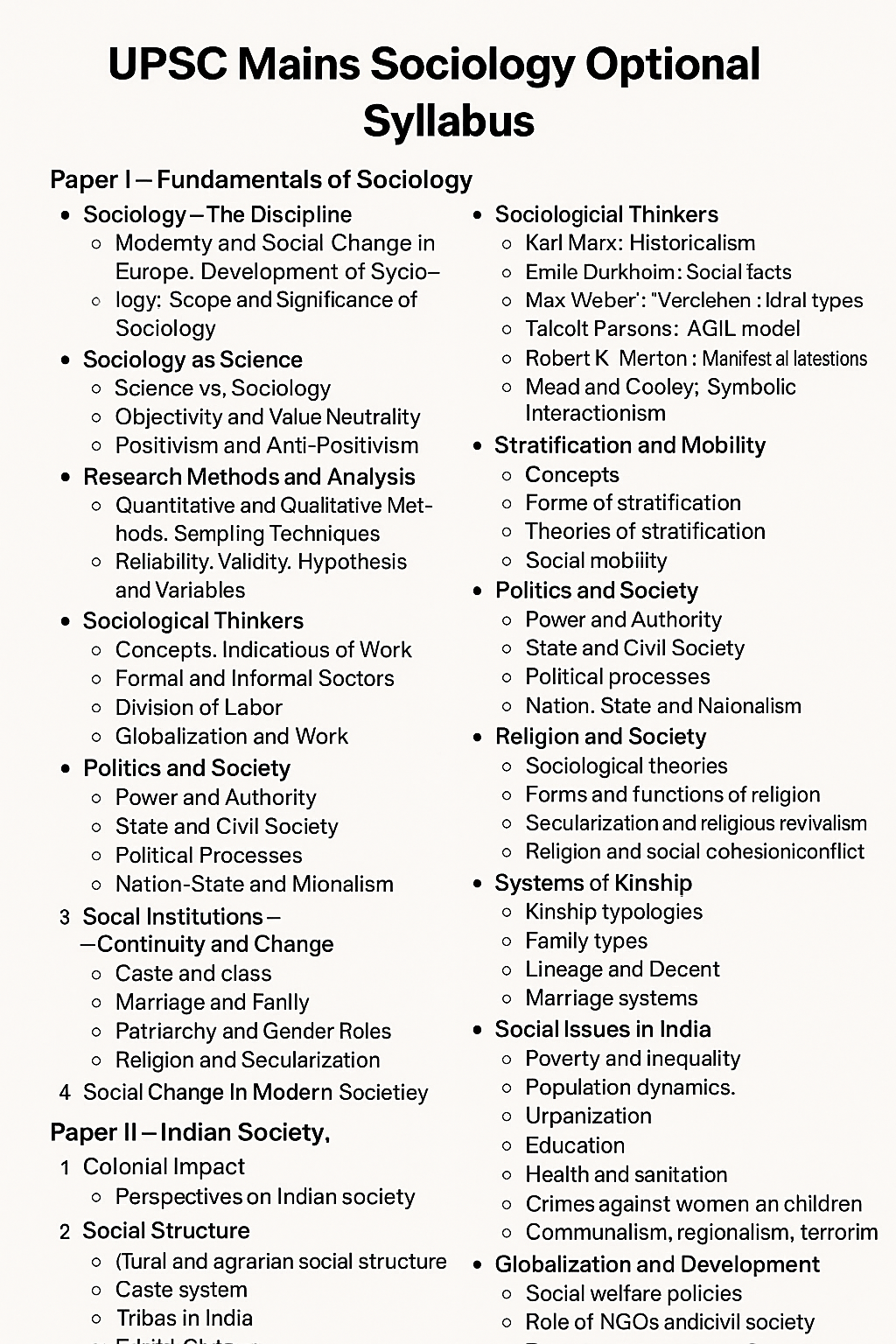UPSC Mains Sociology Optional Syllabus – A Detailed Breakdown
Sociology is one of the most popular optional subjects in the UPSC Civil Services Mains Examination. Known for its concise syllabus, relevance to general studies, and overlap with essay and ethics papers, Sociology offers aspirants a conceptual and analytical edge.
The UPSC Sociology optional syllabus is divided into two papers:
- Paper I – Fundamentals of Sociology (General Principles)
- Paper II – Indian Society: Structure and Change (Application to Indian Context)
Join WhatsApp community for Free Notifications, Updates, Study Material, Mock Tests, Internship Updates, and Current Affairs - CLICK HERE TO JOIN
PAPER I – Fundamentals of Sociology
This paper focuses on theoretical foundations, basic concepts, thinkers, and the evolution of sociological thought, primarily rooted in Western Sociology.
1. Sociology – The Discipline
- Modernity and Social Change in Europe:
- Transition from feudalism to capitalism.
- Enlightenment and rationality.
- Scientific revolution and industrialization.
- Development of Sociology:
- Emergence as a discipline in 19th-century Europe.
- Separation from philosophy and other social sciences.
- Scope and Significance of Sociology:
- Application in policy-making, development studies, media, criminology, etc.
2. Sociology as Science
- Science vs. Sociology:
- Characteristics of scientific method.
- Differences and debates on whether Sociology is a science.
- Objectivity and Value Neutrality:
- Max Weber’s “Verstehen” (interpretive understanding).
- Ethical considerations in research.
- Positivism and Anti-Positivism:
- Auguste Comte and Emile Durkheim’s positivist approach.
- Interpretivism: Weber, Mead, and phenomenologists.
3. Research Methods and Analysis
- Quantitative and Qualitative Methods:
- Surveys, experiments, ethnography, interviews, and case studies.
- Sampling Techniques:
- Random, stratified, snowball, and purposive sampling.
- Reliability, Validity, Hypothesis, and Variables:
- Importance in formulating and testing theories.
- Data Collection and Analysis:
- Techniques in processing, interpreting, and presenting sociological data.
To Enroll in FIRST IAS INSTITUTE - Click Here
4. Sociological Thinkers
(Classical Thinkers with Theories)
- Karl Marx:
- Historical materialism.
- Class conflict and alienation.
- Emile Durkheim:
- Social facts, collective conscience.
- Suicide study and division of labor.
- Max Weber:
- Verstehen, ideal types.
- Bureaucracy and protestant ethic thesis.
- Talcott Parsons:
- AGIL model, social system theory.
- Robert K. Merton:
- Manifest and latent functions.
- Anomie theory, reference groups, and middle-range theory.
- Mead and Cooley:
- Symbolic interactionism.
- “I” and “Me”, looking-glass self.
5. Stratification and Mobility
- Concepts:
- Inequality, hierarchy, social exclusion.
- Forms of Stratification:
- Caste, class, gender, ethnicity, race.
- Theories of Stratification:
- Functionalist (Davis-Moore), Conflict (Marx, Dahrendorf), Weberian.
- Social Mobility:
- Types: vertical, horizontal, intergenerational, intragenerational.
- Factors affecting mobility: education, urbanization, policy.
6. Works and Economic Life
- Social Organization of Work:
- Pre-industrial, industrial, post-industrial work systems.
- Formal and Informal Sectors:
- Characteristics, challenges, and role in employment.
- Division of Labor:
- Durkheim’s view vs. Marxist analysis.
- Globalization and Work:
- Impact of MNCs, outsourcing, gig economy.
7. Politics and Society
- Power and Authority:
- Types of authority: traditional, charismatic, legal-rational.
- State and Civil Society:
- Role in modern democracy, governance.
- Political Processes:
- Elite theory, pluralism, political parties, social movements.
- Nation-State and Nationalism:
- Imagined communities, rise of ethnic nationalism.
8. Religion and Society
- Sociological Theories:
- Durkheim (sacred and profane), Weber (religion and capitalism), Marx (religion as ideology).
- Forms and Functions of Religion:
- Rituals, beliefs, ecclesia, sect, cult.
- Secularization and Religious Revivalism:
- Modernization theory and return of fundamentalism.
- Religion and Social Cohesion/Conflict:
- Interplay with caste, class, ethnicity.
9. Systems of Kinship
- Kinship Typologies:
- Affinal, consanguinal, primary, secondary kin.
- Family Types:
- Nuclear, joint, extended; changes over time.
- Lineage and Descent:
- Patrilineal, matrilineal, bilateral systems.
- Marriage Systems:
- Endogamy, exogamy, polygamy, monogamy.
10. Social Change in Modern Society
- Theories of Social Change:
- Evolutionary, functionalist, conflict, cyclical.
- Modernization and Development:
- Dependency theory, world-systems theory.
- Agents of Change:
- Education, technology, media, state, revolution.
- Globalization:
- Cultural homogenization vs. hybridization.
Join WhatsApp community for Free Notifications, Updates, Study Material, Mock Tests, Internship Updates, and Current Affairs - CLICK HERE TO JOIN
PAPER II – Indian Society: Structure and Change
This paper applies sociological concepts to the Indian context, covering institutions, stratification, social issues, and transformations.
1. Introducing Indian Society
- Perspectives on Indian Society:
- Indological (G.S. Ghurye), structural-functional (M.N. Srinivas), Marxist, Subaltern.
- Colonial Impact:
- Social reform movements, legal changes, census, modern education.
2. Social Structure
- Rural and Agrarian Social Structure:
- Land ownership, caste in villages, rural power hierarchy.
- Caste System:
- Characteristics, Jajmani system, caste mobility, sanskritization.
- Tribes in India:
- Classification, issues of identity, assimilation vs. integration.
- Social Classes:
- Agrarian classes, middle class, capitalist class, proletariat.
- Family and Kinship in India:
- North vs. South kinship patterns, marriage rituals, kinship obligations.
- Religious Communities:
- Major religions, inter-religious dynamics, secularism and communalism.
3. Social Institutions – Continuity and Change
- Caste and Class:
- Changing interfaces; reservation politics.
- Marriage and Family:
- Trends of nuclear families, inter-caste and inter-faith marriages.
- Patriarchy and Gender Roles:
- Traditional roles, emergence of feminism.
- Religion and Secularization:
- Communalism, minority rights, religious pluralism.
To Enroll in FIRST IAS INSTITUTE - Click Here
4. Challenges of Social Transformation
- Social Movements:
- Dalit, tribal, women’s, environmental, peasant movements.
- Regionalism and Ethnicity:
- Identity politics, sub-nationalism.
- Social Change and Development:
- Role of planning, NGOs, state and market forces.
- Affirmative Action:
- Policies for SCs, STs, OBCs; debates on creamy layer and inclusion.
5. Social Issues in India
- Poverty and Inequality:
- Multidimensional poverty, urban slums, inequality in access.
- Population Dynamics:
- Demographic dividend, fertility trends, migration.
- Urbanization:
- Challenges: housing, sanitation, slum development, urban sprawl.
- Education:
- Disparities in access, Right to Education Act, privatization.
- Health and Sanitation:
- Public health infrastructure, rural health challenges.
- Crimes Against Women and Children:
- Domestic violence, trafficking, child labor, POCSO.
- Communalism, Regionalism, and Terrorism:
- Role of identity, politics of hate, conflict zones.
6. Globalization and Social Change
- Economic Reforms and Liberalization:
- Impact on inequality, employment, culture.
- Cultural Change:
- Westernization, consumerism, media.
- Diaspora and Transnationalism:
- NRIs, brain drain, cultural exchange.
- ICT and Society:
- Digital divide, e-governance, online activism.
7. Social Policy and Development
- Social Welfare Policies:
- MGNREGA, RTE, NRHM, food security.
- Role of NGOs and Civil Society:
- Advocacy, service delivery, empowerment.
- Social Legislation and Reforms:
- Anti-dowry laws, domestic violence act, SC/ST atrocities act.
- Inclusive Development:
- Issues of access, participation, representation.
Join WhatsApp community for Free Notifications, Updates, Study Material, Mock Tests, Internship Updates, and Current Affairs - CLICK HERE TO JOIN
Final Thoughts
The Sociology optional offers aspirants a deep analytical tool to understand society. Mastering both theoretical foundations in Paper I and the applied aspects of Indian society in Paper II is key to scoring well. Make sure to:
- Integrate thinkers and case studies in Paper II.
- Relate current affairs with sociological concepts.
- Use examples, diagrams (like kinship maps), and statistics where applicable.
If you'd like this as a downloadable PDF or blog HTML format, let me know — I can format it accordingly for your platform or website.


 firstiasofficial@gmail.com
firstiasofficial@gmail.com
Leave a Comment